Since last October BBC audiences have seen a number of items that were the product of BBC journalists’ UNIFIL escorted trips to southern Lebanon, including the following:
BBC NEWS ONCE AGAIN ERASES UNSC RESOLUTION 1701 FROM A LEBANON STORY
BBC REPORT FROM SOUTH LEBANON IGNORES UNSC RESOLUTION 1701
Like most of the additional BBC reporting on the situation in the north of Israel and southern Lebanon since October 2023, those reports were particularly notable for their failure to even mention UN Security Council resolution 1701 and UNIFIL’s failure to enforce that 2006 resolution, according to which the Lebanese terrorist group Hizballah is barred from maintaining a military presence south of the Litani river – some 30 kms north of the border with Israel.
That crucial background – along with any explanation of the real agenda of the Iranian proxy Hizballah – was once again absent from filmed (“Are Israel and Hezbollah edging closer to all-out war?”) and written reports (“Smoke on the horizon – Israel and Hezbollah edge closer to all-out war”) by Orla Guerin which appeared on July 17th.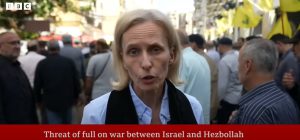
Reporting from southern Lebanon and from a Hizballah rally in Beirut, Guerin does however promote some noteworthy narratives, the most ridiculous of which is the claim that Israeli aircraft operating in the region break the sound barrier in order to “spread fear”. [emphasis added]
Written:
“As we speak there is a loud boom which rattles the windows.
Hussein says it is a normal, daily occurrence.
“Since a long time, Israel killed our people here,” he says.
“We can’t forgive them. There is no hope of peace with them.”
This time, there is no death or destruction. Instead, Israeli warplanes are breaking the sound barrier to spread fear.”
Filmed:
“This time, no airstrike. Just Israeli war planes breaking the sound barrier: a weapon of fear.”
Both Guerin’s reports promote the notion of equivalence between the Hizballah terrorist organisation which started the current conflict and the sovereign country defending its civilians, tens of thousands of whom had to leave their homes nine months ago.
“Israel and the Lebanese armed group Hezbollah (backed by Iran) have been trading fire across their shared border for the past nine months.”
“Explosions are part of the sound of summer 2024 in the ancient Lebanese city of Tyre, as Hezbollah and Israel exchange fire across the border 25 kilometres (15 miles) away.”
“And the current tit-for-tat has already driven tens of thousands from their homes – more than 90,000 in Lebanon and about 60,000 in Israel.”
In the filmed report Guerin refers to southern Lebanon as “Hizballah heartland” and in the written report, “a Hezbollah stronghold” but like so many of her colleagues before her, she fails to explain what that means in practical terms or to make any mention whatsoever of UN SC resolution 1701.
In the written report, Guerin gives an account of why the current conflict began which aligns with Hizballah’s own propaganda:
“On October 8th last year – one day after Hamas gunmen stormed out of Gaza and killed about 1,200 Israelis as well as taking 251 others hostage – Hezbollah joined in, firing at Israeli targets from Lebanon.
The Shia Islamist armed group said it was acting in support of Gaza.
Soon Israel was firing back.”
Guerin of course does not tell her readers that any other nation that experienced missile attacks by a terrorist organisation operating from an adjacent country would also likely “soon” have been “firing back”.
Later in the written report readers find more Hizballah messaging: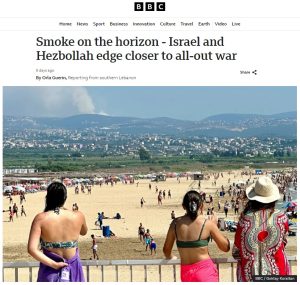
“Hezbollah’s leader, Hassan Nasrallah, has stressed the armed group is ready, but not eager, for war. He says if there is a ceasefire agreed in Gaza, Hezbollah will cease fire too, immediately.
Will that satisfy Israel? Maybe not.
It sees Hezbollah as a permanent threat too close for comfort. At the very least, it wants its heavily armed enemy to pull back from the border.
There have been plenty of bellicose threats. Israel’s Education Minister, Yoav Kish, said Lebanon would be “annihilated”. Defence Minister Yoav Gallant chimed in, saying the country would be returned “to the stone age”.”
Once again Guerin makes no mention of the fact that the 2006 UN SC resolution states that Hizballah should be nowhere near the border with Israel and while she tells her readers that “[i]ts backer Iran […] denies Israel’s right to exist”, she fails to mention that Hizballah’s aim is also the destruction of Israel.
Referring to the Second Lebanon War in 2006 – but failing to tell her readers that Hizballah initiated the conflict by carrying out a cross-border raid into Israeli territory or that it concurrently fired missiles at Israeli civilian communities before any Israeli response took place – Guerin’s written report states:
“In that conflict, Hezbollah fought Israel to a standstill but at huge cost to Lebanon and its people. There was massive destruction, and more than 1,000 Lebanese civilians were killed – according to official figures – along with an unconfirmed number of Hezbollah fighters.
Israel’s death toll was 160, according to the government, most of them soldiers.”
Guerin’s reference to “more than 1,000 Lebanese civilians” is similar to claims which have appeared in BBC reports in the past and is inaccurate. Over five years ago the BBC acknowledged that those “official figures” fail to distinguish between civilians and combatants. As we noted at the time:
“While the Lebanese authorities did not differentiate between civilians and combatants during the 2006 war, Lebanese officials did report even before the conflict was over that some 500 of the dead were Hizballah personnel and UN officials gave similar figures while Israeli estimates stand at around 600 (of whom 450 were identified with certainty: see page 55 here).”
In both her reports Guerin promotes claims made since last October by the anti-Israel NGO ‘Human Rights Watch’ without any mention of that organisation’s “particular viewpoints” and record. That narrative is portrayed as follows in the written item:
“And, since October, Israel has been spreading something else in southern Lebanon – choking, searing clumps of white phosphorus, contained in munitions.
The chemical substance ignites immediately on contact with oxygen. It sticks to skin and clothing and can burn through bone, according to the World Health Organization.
Moussa al-Moussa – a farmer stooped by his 77 years – knows only too well.
He says Israel fired white phosphorous shells at his land in the village of al-Bustan every day for over a month, robbing him of breath, and his livelihood.
“I had my scarf on, and I wrapped it around my mouth and nose until I was brought to the hospital,” he tells me, gesturing to the red and white keffiyeh – the traditional Arab scarf – on his head.
“We didn’t have any masks. I couldn’t breathe. I couldn’t see a metre in front of me. And if you touch a fragment a week later it will ignite and burn again.”
The international campaign group, Human Rights Watch, has verified the use of white phosphorus over several populated areas in southern Lebanon, including al-Bustan.
It says Israel’s use of white phosphorus is “unlawfully indiscriminate in populated areas”.
The Israel Defense Forces (IDF) dispute this, saying the use of white phosphorus shells to create a smokescreen “is lawful under international law”. It says these shells are not used in densely populated areas “with certain exceptions”.”
Guerin of course did not display any interest in telling BBC audiences what sort of Hizballah infrastructure was located in the locations in which white phosphorus shells may have been used.
With its focus on accounts provided by Lebanese citizens at a holiday resort, from two villages and at a Hizballah rally, this long report by the BBC’s senior international correspondent provides scant information about the view from the other side of the border. Guerin even gives the impression that the destruction of homes and agricultural land in civilian communities is limited to Lebanon.
“So far, both sides are mainly striking military targets, close to the border – staying within familiar red lines.
But here on the Lebanese side, we have seen destruction in civilian areas with scorched fields, flattened houses and abandoned villages.”
Her very few mentions of the Israeli side of the story are inevitably presented together with information from the Lebanese side:
“And the current tit-for-tat has already driven tens of thousands from their homes – more than 90,000 in Lebanon and about 60,000 in Israel.
Israeli officials say 33 people have been killed so far in Hezbollah attacks, mostly soldiers.
Lebanon’s losses are far higher at 466, according to the Ministry of Health here. Most of the dead were fighters. […]
As the attacks and counter attacks continue, families are destroyed. This month parents have been ripped from children, and children from parents.
An Israeli couple were killed in their car by Hezbollah rockets as they headed for home in the Israeli-occupied Golan Heights in Syria. They left behind three teenage children.
And in southern Lebanon three children were killed in an Israeli strike earlier this week. They were aged between four and eight, and their parents were Syrian farm workers.”
Notably, that reference to “an Israeli couple” is the first – and so far, only – mention on the BBC News website of the attack eight days earlier in which Noa and Nir Baranes were killed by a direct missile hit on their vehicle.
Guerin’s reports (and others) on the topic of the possibility of what she terms “all-out war” between Israel and Hizballah continue the long-standing BBC tradition of depriving audiences of the full range of information needed to understand the factors – including the UN’s failure to implement its own UNSC resolution from 18 years ago – which have prepared the ground for the current escalation of hostilities and any future conflict.
Related Articles:
BBC’S ORLA GUERIN IGNORES THE ELEPHANT IN SOUTHERN LEBANON
BBC NEWS WEBSITE AMENDS SECOND LEBANON WAR CLAIM
WHY BBC AUDIENCES WON’T UNDERSTAND THE NEXT ISRAEL-HIZBALLAH CONFLICT – PART ONE
WHY BBC AUDIENCES WON’T UNDERSTAND THE NEXT ISRAEL-HIZBALLAH CONFLICT – PART TWO

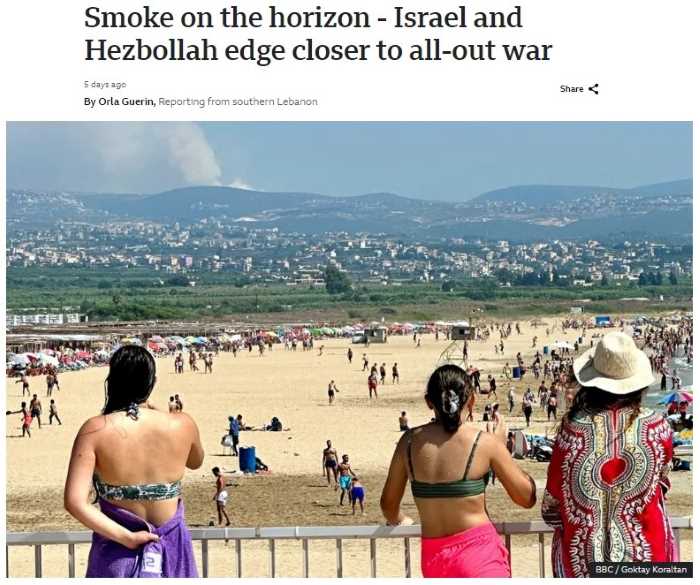
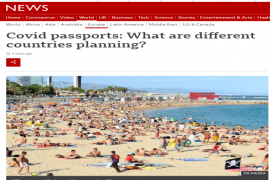
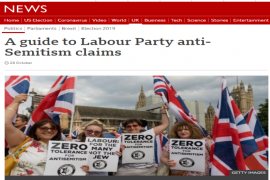
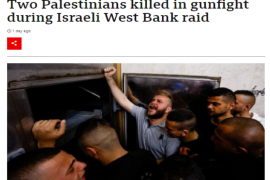

If one checks on https://www.gov.uk/government/publications/proscribed-terror-groups-or-organisations–2/proscribed-terrorist-groups-or-organisations-accessible-version
According to UK Government it is a proscribed terrorist rganisation – yet the BBC Guerin is incontact with them – should she be arrested in the UK, US, Canada, the Netherlands, the Gulf Co-operation Council and Bahrain
“Hizballah (Party of God) – Proscribed March 2019
Hizballah is committed to armed resistance to the state of Israel and aims to seize all Palestinian territories and Jerusalem from Israel. It supports terrorism in Iraq and the Palestinian territories.
Hizballah was established during the Lebanese civil war and in the aftermath of the Israeli invasion of Lebanon in 1982. Hizballah is committed to armed resistance to the state of Israel and aims to seize all Palestinian territories and Jerusalem from Israel. It supports terrorism in Iraq and the Palestinian territories. Hizballah continues to amass an arsenal of weapons in Lebanon, in direct contravention of UN Security Council Resolutions 1701 and 1559, putting the security of the region at risk. Its involvement in the Syrian civil war, since 2012, continues to prolong the conflict and the regime’s brutal and violent repression of the Syrian people – violating the Lebanese government’s policy of disassociation from regional conflicts, increasingly destabilising the region’s long-term stability.
Hizballah, as a political entity in Lebanon has won votes in legitimate elections and forms part of the Lebanese government. It has the largest non-state military force in the country.
The UK government proscribed Hizballah’s External Security Organisation in 2001. In 2008, the proscription was extended to include the whole of Hizballah’s military apparatus, namely the Jihad Council and all the units reporting to it.
Hizballah itself has publicly denied a distinction between its military and political wings. The group in its entirety is assessed to be concerned in terrorism.
The US, Canada, the Netherlands, Israel, the Gulf Co-operation Council and Bahrain also designate the group in its entirety as a terrorist organisation”